
MCC DIMA degree lands Pape at NASA Moon shot:









MCC DIMA degree lands Pape at NASA Moon shot:







As summer comes to a close, we find ourselves at the onset of a new and exciting fall quarter and academic year here at Metropolitan Community College. This transition brings a fresh sense of possibility and enthusiasm for what lies ahead.
In this issue, we are thrilled to share some of the incredible achievements and inspiring stories that reflect the vibrant spirit of MCC. New science, technology, engineering and math (STEM) programming opportunities in robotics and urban agriculture capture the spirit of innovation.
Our graduation feature celebrates the remarkable accomplishments of our graduates and the special reasons that bring our students to MCC. Our cover story shares the remarkable journey of an MCC alum now reaching for the stars at NASA. This issue is brimming with highlights that showcase the diverse talents and aspirations of our students.
We are also proud to shine a spotlight on our students who brought home medals from SkillsUSA, a testament to their hard work, dedication and ability. Their success exemplifies the excellence that MCC strives to foster in all our programs.
As we embark on this new quarter, we look forward to building on the momentum of these achievements and continuing to support our students as they reach unprecedented heights. Thank you for your unwavering support and commitment to MCC. Together we are making a difference in the lives of our students and in the fabric of our community.
Sincerely,

Amy Recker Associate vice president for advancement Executive director, MCC Foundation
Credits
“I have my dream job. I feel very blessed to be right out of school and have the exact job I have always wanted. I don’t want to work anywhere else.”
Children often aspire to become astronauts, but the childhood dream Claire Pape is living is truly the stuff of dreams.
“Working at NASA was my childhood dream — I already had that in the back of my mind, but it never really seemed practical. I told my mom I was going to work at NASA one day. She was like, ‘Okay, but how in the heck do you work for NASA?’” said Pape, who completed an associate degree in 3D Animation and Games at Metropolitan Community College in 2023.
For Pape, working at NASA involved being bold enough to apply. A failure of effort was not an option, and her persistence paid off. Through a government contract with her aerospace engineering employer, Analytical Mechanics Associates, Pape reports to work from NASA’s Langley Research Center in Hampton, Virginia.
One year into her first job out of college, Pape is involved in work that aims to put the first humans on the moon in more than 50 years as part of NASA’s Artemis missions. The goal of the Artemis missions is to promote sustainable exploration of the moon that is intended to pave the way for astronauts to eventually walk on Mars.
Pape, 24, works with NASA engineers who have earned some of the most coveted degrees from elite universities. She recently created a 3D model of a robotic system that will travel nearly 250,000 miles beyond Earth’s atmosphere and reflect the sun’s rays into the darkest depths of the mysterious region near the lunar South Pole, using mirror panels to provide solar power to devices doing scientific study in the darkness.
The cratered area has never been physically explored, but studies suggest the landscape provides hints to how water may be moving across the moon’s surface.
“I have my dream job. I feel very blessed to be right out of school and have the exact job I have always wanted. I don’t want to work anywhere else. Like, this is it for me,” Pape said.
Pape said she took every opportunity to check in on her hiring status so people with the ability to extend her an offer couldn’t leave it up to interpretation if she wanted the job.
“I was emailing them for updates, showing them that I was passionate about it and would do whatever they wanted me to do to get it,” Pape said.
MCC instructors in the Design Interactivity and Media Arts (DIMA) program getting to know their students also played a pivotal role in helping Pape reach her moon-shot goal for employment, she said.
Pape has a unique blend of talent that relies on alternating between each hemisphere of her brain. On the way to finishing high school at Omaha Skutt Catholic in 2018, she was accepted to art schools where she intended to explore her creative interests in photography. She also won a national championship in the academic decathlon her senior year of high school, finishing with a growing interest in physics.
Deciding to “do something more practical” and based in the health sciences, Pape enrolled at MCC after high school to pursue a career in nursing. She then transferred to a four-year college in Nebraska to begin working on a bachelor’s degree in physics — until her artistic side tugged her back to MCC and into the DIMA program to explore 3D Animation and Games.
Providing 3D visual models for aerospace engineering projects has turned out to be a great way to satisfy both her creative and scientific ambitions.
A day at the office for Pape can entail spending some of her working hours hearing about ideas that exist in the minds of some of the world’s greatest scientific and mathematical thinkers.
“I think having a physics background helps me understand what the engineers are talking about,” Pape said. “My team does a lot of engineering visualization. [One of the NASA engineers] will come to us and say, ‘I have an idea for something.’ If we’re lucky, we’ll get a napkin sketch of what they have in their brains, and they’ll be like, ‘Can you put this in a 3D model for me?’”
Tapping into the part of her brain that is fascinated by physics while simultaneously accessing the area of her mind where her inner artist maintains residency, Pape takes it all in and then works with her team to put out a design that represents the concept.
“Usually people are either in one side of their brain or the other. I guess both of mine are kind of going at the same time,” Pape said.
Despite having a sharp academic disposition — Pape won a national championship in academic decathlon in high school “without really studying” — she has never been a top student.
Pape, a self-described “average student,” said MCC DIMA instructor Ian Snyder’s approach to teaching was exactly what she needed. When she had been a physics major, however, Pape said class sizes and lecture halls were too big at the university.
“MCC was a better fit for my personality. I really liked that the teachers could take time for individual students, and I feel like I had a lot more success here because of it,” Pape said.
Pape also took advantage of the expertise at her disposal. Snyder, who has more than 15 years of industry background in gameplay programming and development, said he wants his instruction to feel more like mentorship rather than class to the student.
“[Snyder is] by far the best teacher I’ve ever had at any school. With all the classes I was taking, he was able to tailor them to help me succeed in what I wanted to do,” Pape said.
As DIMA students begin the program, Snyder said the approach is to expose them to the wide-ranging DIMA competencies — drawing; 2D and 3D design; typography; motion graphics design; game design; 3D modeling and animation; web design; and more. During the student’s second year, when they begin more specialized classes, an area of concentration typically emerges, Snyder said. Through getting to know his student, Snyder observed that Pape’s modeling and lighting skills in 3D digital design were superb.
“This is what’s exciting to me as a teacher — when you see a student’s strengths really stand out and you start to see what they’re really leaning into,” Snyder said. “For Claire, she was working on a lot of environments, and one of the first environments she made playing with rendering and lighting was just mind blowing.”
Once an area of specialization surfaces, Snyder has the flexibility to modify courses and assignments to align with the student’s employment goals. When students take Snyder up on his offer for mentorship, he focuses their time on helping them develop an employment-worthy portfolio. Snyder knows from years of working in large game studios — where he discovered his passion for teaching — that the job seeker’s portfolio is the best opportunity for their work to stand out in a pool of hundreds of applicants.
“If your portfolio looks like work that the employer is currently doing or you know they need done, that’s how you get the job. We really focus on that. That gives the employer the confidence that if they hire this job candidate, they will be able to jump right in, and in the first week or two on the job, they will be able to start producing results,” Snyder said.
Pape is feeling settled in her career and her new Virginia home, though it’s all still a bit surreal. A year ago, she was working as a detailer at a car dealership, cleaning up upholstery stains, spilled change and unfriendly odors. At her current job, members of U.S. Congress and other dignitaries routinely tour her office.
While there was no part of her that was going to turn down the offer, she wasn’t sure what kind of culture she would find at her new job, and at 24, how well she would mesh with others in the office.
“I struggled with the transition, especially because I was right out of school and all these people have their bachelor’s, master’s and [doctorates], and here I come in with my associate degree. But they thought I was a good fit for the job,” Pape said.
Pape said there’s mutual appreciation between the 3D generalists on her team and the NASA engineers they work with, who realize the importance of getting the public excited about their ideas, a key part of the work Pape’s team does.
“I’ve learned so much just from talking to people in the headquarters building. If I have a question, everybody’s been willing to help. The
engineers who are building these things love our department and are always talking about the things we do. They’ll come in and say, ‘You guys are amazing. You’re doing things that we could never do,’” Pape said.
The luster of her life in Langley hasn’t quite worn off. After accepting the job, she needed to prioritize getting herself out there first, leaving a prized possession behind — her 1993 Mitsubishi 3000GT. The street racer gives a view into her physics mind with the “weight reduction,” “suspension” and “aerodynamic” work she has done.
The car is complete with two 20-pound nitrous oxide tanks “just for show.” Pape came back to Omaha in May to pick it up and drive it back to Virginia, where she gives herself an exciting affirmation.
“Almost every day, my inner child is still like, ‘We’re going to NASA,’” Pape said.

MCC celebrates commencement with enrollment and completion
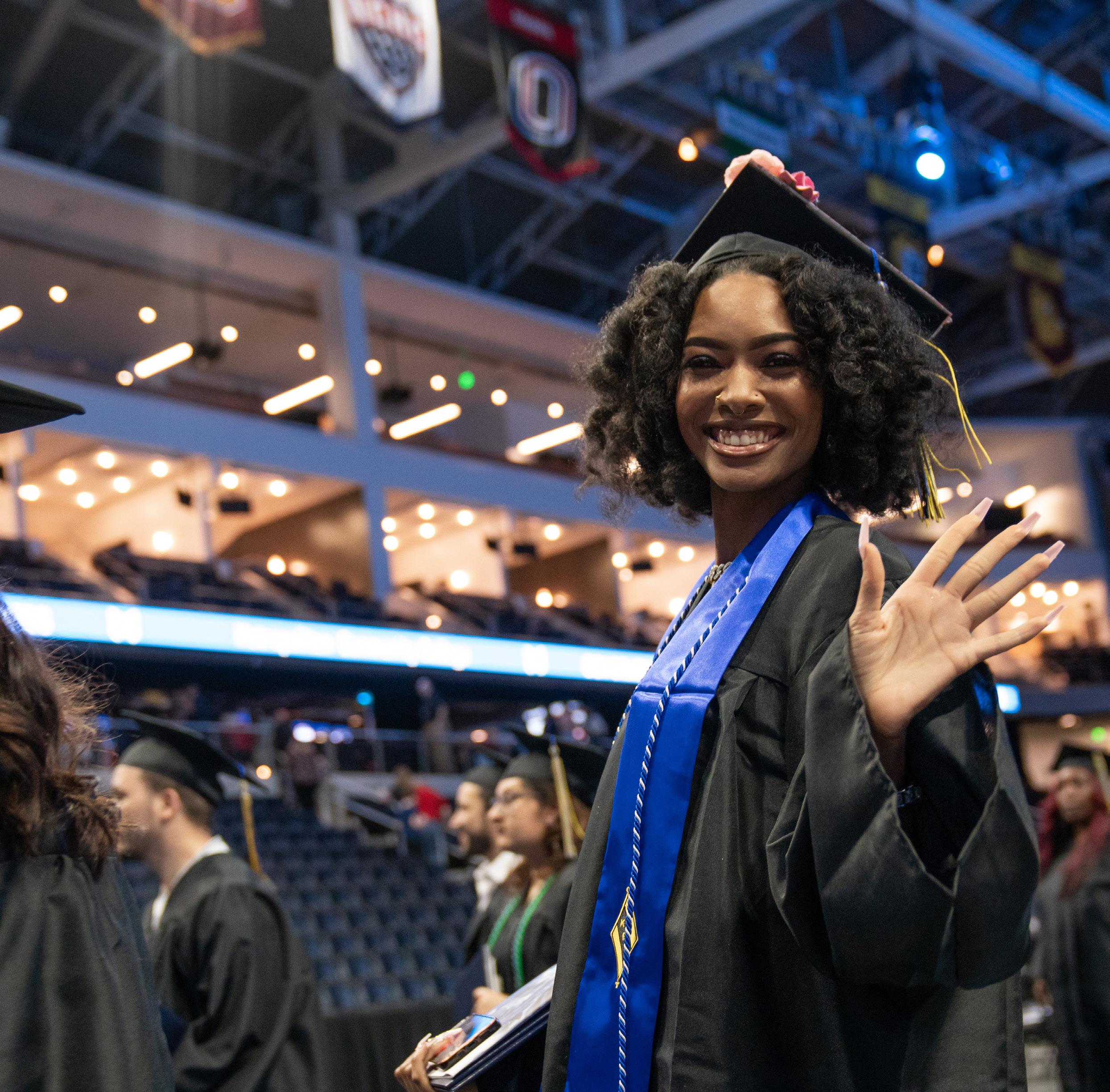
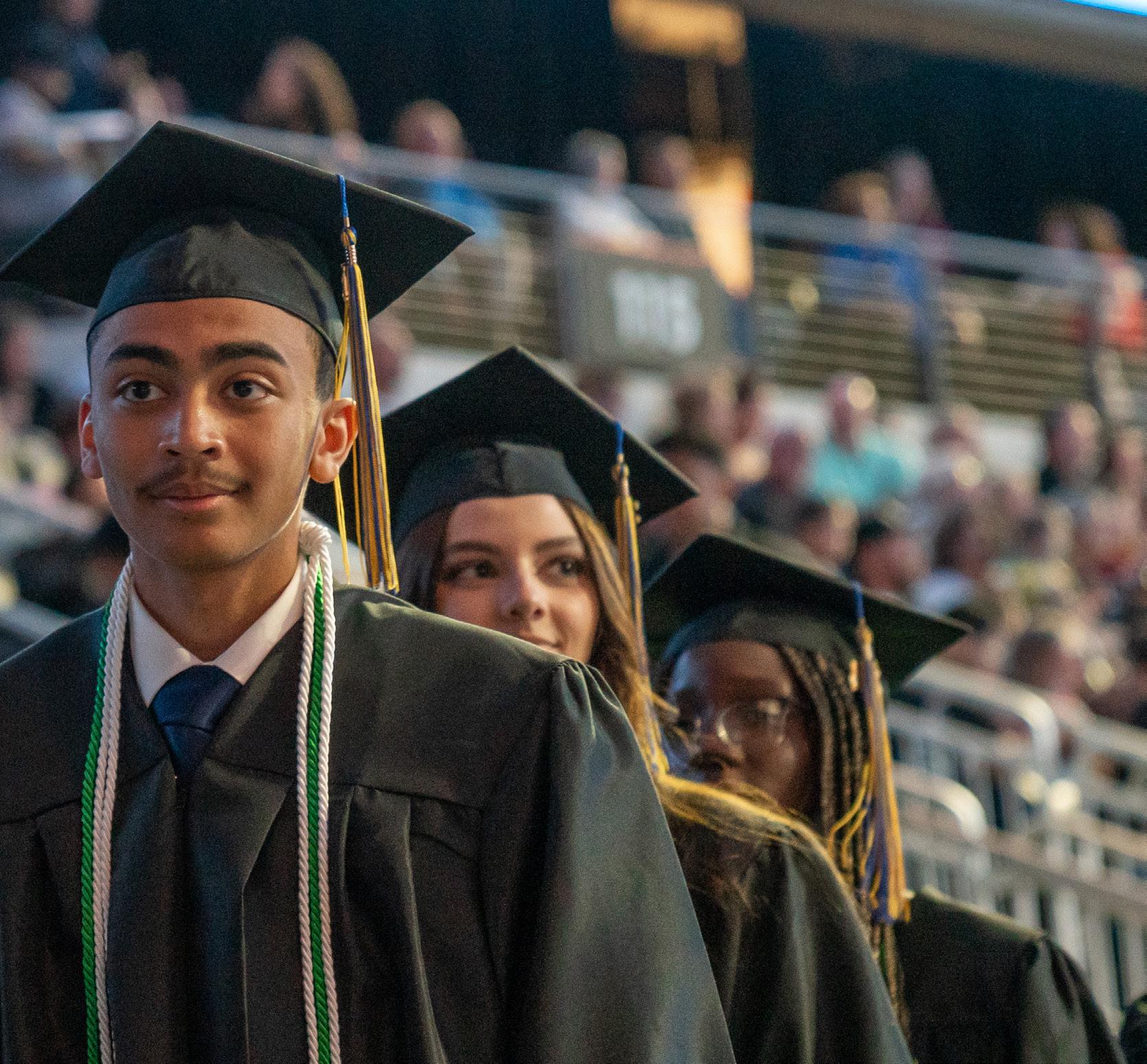
Laquita Staton stood on the concourse of the second level of Baxter Arena, overlooking the procession of Metropolitan Community College graduates as they filed in while “Pomp and Circumstance” played. With a dozen roses tucked in her arm and a congratulatory card in hand, she gushed about her finance-minded sister Ashley.
“When I called her yesterday, she said she couldn’t talk long because she was doing her homework,” Laquita said of her little sister. “I’m really proud of her because she has worked so hard to be able to walk across this stage today. She’s the second in my family to graduate with a college degree. These roses are for her.”
Ashley Staton was among the 834 MCC students w ho walked across the stage over the course of two commencement ceremonies in May. By the time the 2023-24 academic year officially wraps up at the close of the summer quarter, more than 2,100 students (estimated) will complete MCC academic programs.
The positive energy of an MCC commencement is unique. There is no “wrong time” to celebrate. MCC President Randy Schmailzl encourages guests to cheer on their grads as their names are called. The boisterous applause throughout is fittingly emphatic. The 2023-24 academic year, in addition to being the College’s 50th anniversary, closes out a time at MCC that saw an 8% rise in enrollment and around 400 more students finish their degree or certificate programs than last year.
Also noteworthy was participation in dual enrollment programs by Nebraska high school students, who can take classes at MCC tuition free through the 2024-25 academic year. Official numbers were not available at press time, but more than 8,000 Nebraska high school students took in excess of 110,000 credit hours at MCC in 2023-24. That translates to a minimum savings of nearly $7.5 million in college tuition for students and their families.
Every student who walked the stage (or chose not to) had special reasons that brought them to MCC. A common theme among many who articulated their experience at the College was that they received support from faculty and staff that made a positive difference.
Whether their time at MCC began during high school — 140 Millard Public Schools Early College students alone completed their MCC academic program during their high school graduation year — right after or later in life, students felt like they had people who invested in them at MCC after they made the choice to invest in themselves.
James Henley, 42, had a 20-year gap between the first class he took at MCC as a young man and the last class he took in middle age to finish his associate degree in carpentry. He earned credits for the experience he gained in the workforce between his stints at MCC, but he needed something extra to finish his associate degree.
“I enjoyed the classroom setting. The teachers were very good, helpful and informative. It helped my confidence knowing that I had people in my corner,” said Henley, who is considering getting his bachelor’s degree in construction management. “It means a lot to me. It just shows you there’s never an end. You can always keep going.”
Ruth Guardiola, 33, is a mother of three. She enrolled in college immediately after finishing high school and had a “terrible experience.” The school she attended no longer exists, but the debt she accumulated f rom attending it certainly hung around.
Guardiola had two things to prove when she decided to start taking Automotive Collision Technology courses in 2021. First she wanted to show herself and her kids that she could do the work. She also wanted to demonstrate that there’s a place for women in body shops.
“I wanted to learn how to fix cars and have always had an interest in that, but we were told at a very young age that’s not where women belong,” Guardiola said.
“I hope she can look back to today and understand that mom did a lot of work to get here.”

Guardiola shared that her 14-year-old daughter was mad that she was at her mom’s graduation instead of the Cinco de Mayo parade that Friday evening. Her mom hoped, in time, her daughter would realize that the time to celebrate Cinco de Mayo is predictable; the right time to go back to school doesn’t fit as neatly on a calendar.
“I hope she can look back to today and understand that mom did a lot of work to get here,” Guardiola said.
Alejandro Salome-Garcia of Fremont reflected on fulfilling a goal his mom worked hard to see him achieve. The youngest of three children, Salome-Garcia is a first-generation college student who completed his associate degree in criminal justice at MCC.
He plans to attend Bellevue University to complete his bachelor’s next. He wants to work with youth on probation.
“I did this for my mom. She’s a single mom and raised all three of us. I saw all her hard work and dedication. I love her and I’m glad that she’s my mom. She encouraged me to go to school, and I’m proud of myself for doing it,” Salome-Garcia said.
Jacob Knapp, 23, grew up in Grand Island and said he had a hard time in high school, challenged by a reading disability. Finishing his time at MCC on the honor roll was a big accomplishment. Knapp credits the smaller class sizes he found at MCC and Ryan Stamm, a Disability Support Services counselor, with making it a good experience for him. He plans to go to the University of Nebraska Omaha to earn a bachelor’s degree in social work next.
“My biggest class at MCC had no more than 30 people in it. At other schools, all the gen ed classes have hundreds of people in them,” Knapp said. “All of my instructors were amazing. They gave me extra time on tests. And Ryan Stamm is just a great guy. I really like working with him.”
In addition to the College’s associate degree/certificate programs, three special guests from a community partnership program also walked the stage at MCC commencement.
Two years ago, a group of young adult students in Autism Action Partnership’s Prosper Academy, an in-residence, independent living skills program, started taking classes from the Academy’s curriculum at the MCC South Omaha Campus.
The goal of the classes was to provide them with an authentic college experience. During their time in Prosper Academy, participants learned independent living skills like managing a schedule, arranging transportation and maintaining employment, all while taking classes.
Lizzy Lanspa, an AAP activities coordinator, was feeling the emotions before the program even started. All three who walked the stage (and an additional two who did not attend commencement) will move into their own residence at the conclusion of the program. It’s a result she wouldn’t have predicted two years ago.
“I’m already getting teary-eyed,” Lanspa said after leaving her students to join MCC completers in the lineup before the procession into the arena. “They came into the program as adults, but to see them really thriving has been radically life-changing for me. They’ve changed my perception on what I think an adult is and what I think independent living is. It’s just been amazing to watch them grow, learn new things and be proud of themselves for what they’ve done. MCC has been an amazing partner.”
Laquita Staton wished she had a bouquet of roses for all the graduates because of her appreciation for their individual journeys to the stage last week.
“I’m proud of everybody who walked even though I obviously don’t know the majority of these people. Anytime somebody is graduating — elementary school, junior high, high school or college — I think that’s a big thing because a lot of people drop out or can lose momentum. I’m grateful to see so many succeeding and living out their dreams,” Staton said.
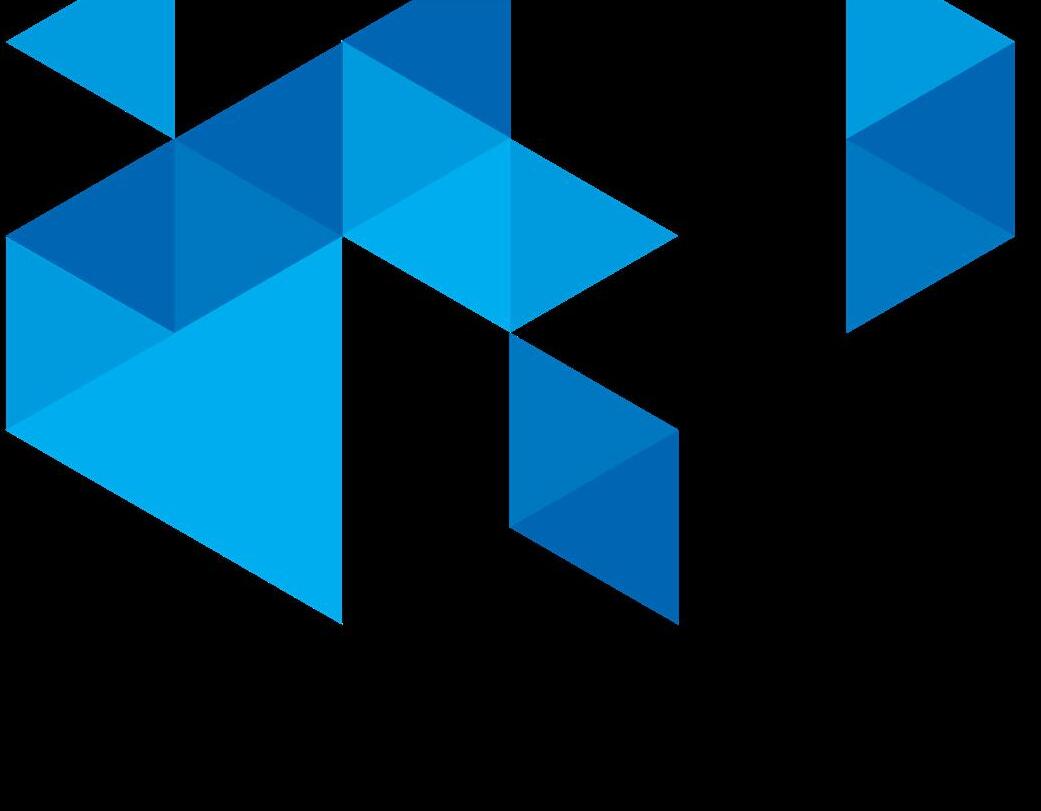



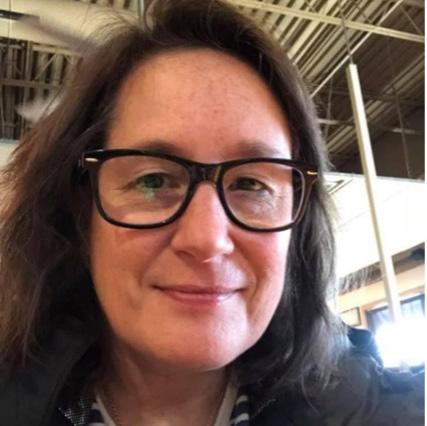
I chose to attend MCC because at the time they offered a grant to get women into Information Technology and I took advantage of the opportunity.
Before graduating, I entered the intern program at Mutual of Omaha and began work in the Information Services area, working on and with databases. Mutual’s tuition assistance program allowed me to continue on with my degree after the grant program ended.
My career path has been amazing. The following has transpired all within the past three years:
I started as a tech intern. After three months I was offered a full-time role as a tech specialist. When I completed my associate degree in IT, I was offered a position as associate database administrator. Within another year I was offered the full database administration position.

Holly Wandell
Associate of Applied Science in Information Technology
My salary has more than doubled, affording me stability, and I still have career growth options through education programs with Mutual to learn other IT career paths.
MCC Information Technology Dean Art Brown strongly encouraged me to interview and accept the Mutual of Omaha internship. If I hadn’t listened to him, things might be drastically different!
My education at MCC has completely changed my life.

I chose to attend Metropolitan Community College because of its location and affordability. The cost of tuition was less than half the expense of neighboring academic institutions. With the assistance of scholarships and grants, I paid little to no money for a great education and a promising career.
One of the most significant moments since graduating from MCC has been earning my bachelor’s degree in psychology while obtaining a minor in sociology. Because I was able to transfer the credits from my associate degree
Associate of Applied Science in General Studies

in general studies at MCC to Buena Vista University, I was able to further my education. Since then, I have been given the opportunity to work for the largest mental health system in the Midwest, Community Alliance.
My most memorable moment at MCC was graduating with honors. I was very proud of myself for staying focused and wanting to better myself. I remember studying when I felt too tired after a long day of work. Well, guess what, sweets? I made it! If you stay the course you will, too!

Veach, Gizmo and Diablo take MCC immersive learning on tour with robotics and urban agriculture programming


Picture a Nebraska postcard scene. Sun-drenched farmland spans a vast horizon lined with rows of soybeans. A farmer patiently runs a tractor with a sprayer, rolling through acres upon acres for hours. The sprayer indiscriminately applies herbicide over everything growing in the field to kill off spots of weeds attempting to crowd out the crop.
Now picture the same field w ith unoccupied, autonomous equipment passing through it. Cameras are mounted along the sprayer line. Guided by artificial intelligence, the tractor travels the field with its equipment scanning and identifying in milliseconds whether what shows up in the viewfinder is a soybean or a weed. When a weed is recognized, a targeted blast of herbicide covers the exact location of unwanted growth.
Rather than spend the hot, humid day in the cabin of the tractor, the farmer weeds through and pulls data on a tablet, monitoring a small fleet of robotic workers, making programming adjustments where necessary to increase productivity and cut operating costs.
Artificial intelligence. Robotics. Automation. Technologies once presented as futuristic ideas in sci-fi books and movies now affect the experience of everyday life. They’ll only become more commonplace in the years ahead — especially in an employment landscape shaped by an aging and shrinking workforce.

Look no further than the robots chopping avocados at select Chipolte restaurants, the drones that are delivering Amazon packages in College Station, Texas, or the autonomous Waymo cabs that caught the attention of MCC project manager Randy Veach.
Veach manages Metropolitan Community College’s participation in the $1 billion Build Back Better Regional Challenge (BBBRC) federal grant program. Funding was awarded to 21 recipients throughout the nation, regional coalitions of partnering organizations intended to “enable each region's economic transformation and competitiveness” for the future of work.
In 2022, Invest Nebraska Corporation, an organization focused on supporting the













growth of the state economy, was awarded $25 million to establish the Heartland Robotics Cluster. HRC was created to position Nebraska to be one of the leading research and workforce development centers in the country for robotics and automation in the agriculture and advanced manufacturing industries. As a partnering organization, MCC, along with Northeast Community College, will expand robotics instruction in the state through education, community outreach, competition and workforce training.





















During its beginning stage of participation, MCC developed a workforce training curriculum in robotics and automation. Through a progression of noncredit programming, by the close of the 2027-28 academic year, the College expects to achieve the following outcomes:





















MCC offered College for Kids and Teens robotics camps for free at MCC at Yates Illuminates and the Fort Omaha Campus over the summer. Programming continues to ramp up this fall, with Veach taking robotics and urban agriculture on a road show to each MCC campus in a decked-out trailer with a fully equipped workshop for hands-on robotics demonstrations. Local schools can even request to have the trailer visit their school for an on-site field trip. The road show will also make appearances at community events.

















Veach will be joined by two high-tech sidekicks during the tour, Gizmo and Diablo. Gizmo is a robotic dog that can complete dozens of commands with obedience that would humble most pet owners. It looks like a robot but moves with animal-like precision.








• 540 K-12 students participate in school robotics competitions
















• 64 students receive a two-year degree at MCC in Robotics/Prototype Design





• 50 new robotics/automation jobs created in the North and South Omaha communities




Diablo is a wheeled-leg robot that functions like a miniature all-terrain vehicle with customizable applications for completing tasks such as materials transport, surveillance and inspection in industrial settings.

• 152 people participate in learning and educational outreach events



• 18 urban farming and agricultural technology community outreach events












Veach joined MCC Community and Workforce Education last year to help engage the community and support the College’s new offering of noncredit robotics camps, courses and immersive learning experiences for kids, teens and adults. All programs are designed to demystify robotics — and build awareness of the sustainable employment opportunities that come with their emergence in the workplace.































Controlling the movements of both robots with a programmable remote that looks like a video game controller, Veach demonstrates their capabilities with the goal of showing anyone who interacts with Gizmo or Diablo that robotics is approachable.










The style of learning also helps to dispel misconceptions about the required technical ability to understand automation. Through “structured play,” Veach said students are introduced to the foundations of automation — engineering and programming.











































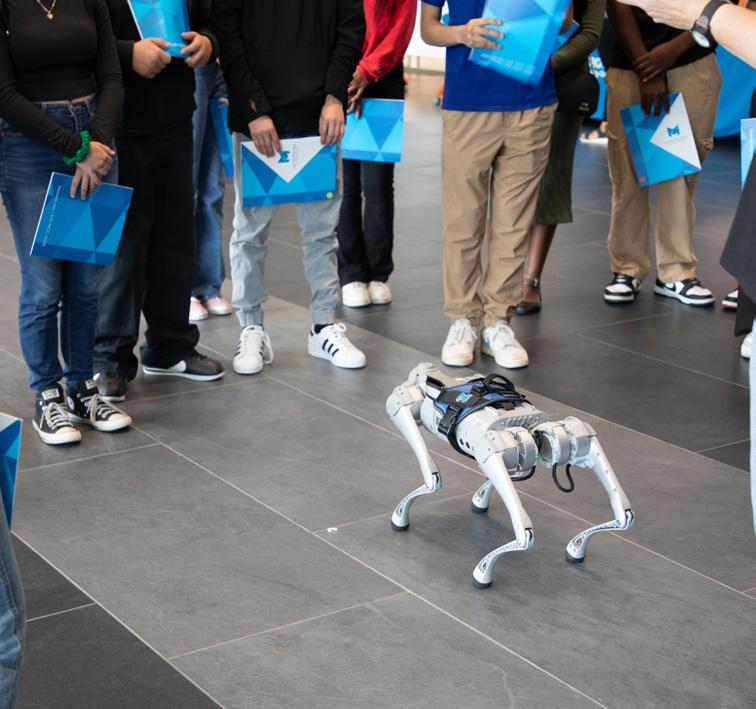




















































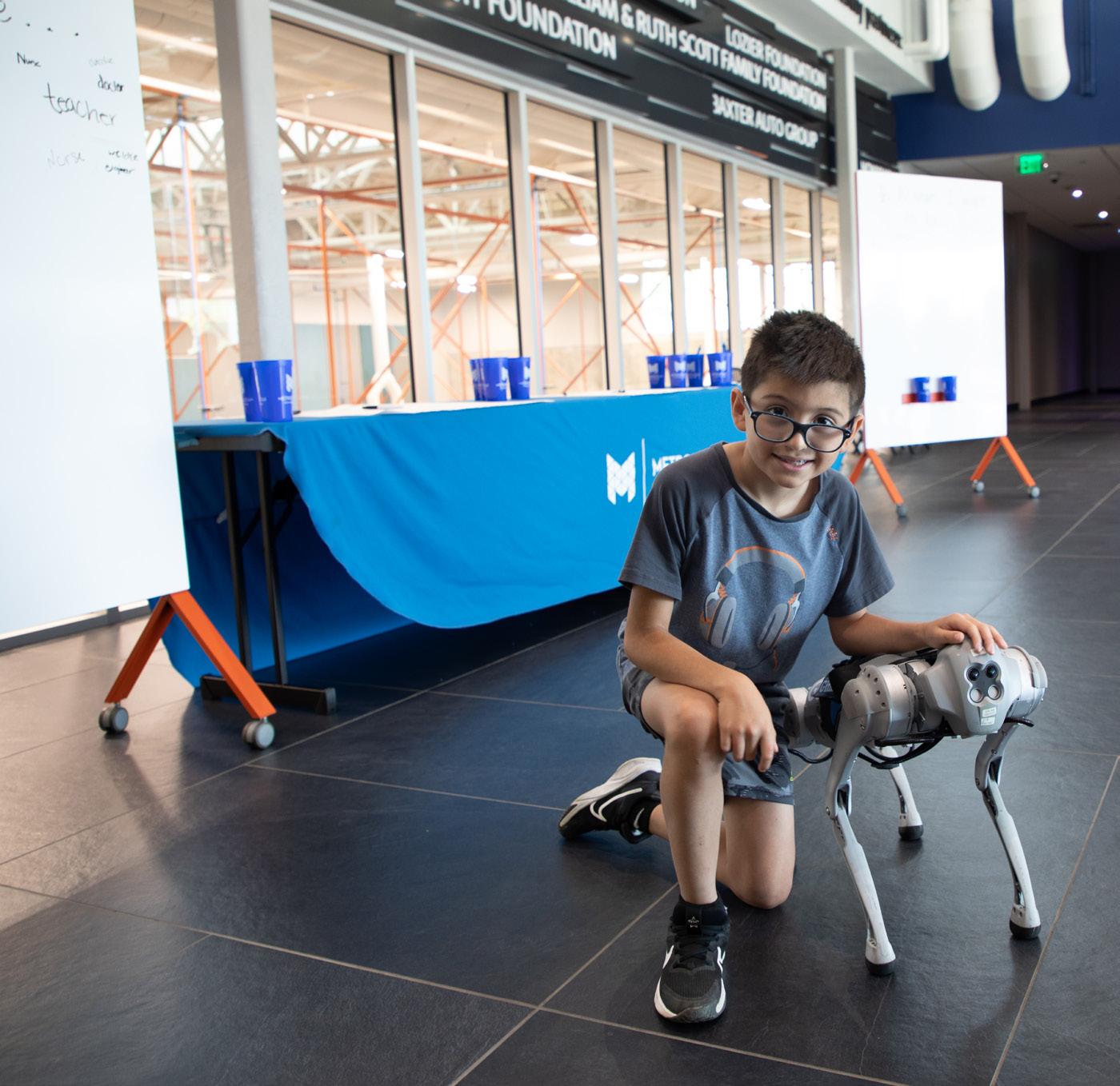
“It’s all about refining the teaching to make it easier for them and get them excited about what they’re learning,” Veach said.
Two tuition free College for Kids LEGO ® Robotics courses offered this fall will teach students ages 8 to 12 how to program, engineer and build robots to complete obstacle courses and accomplish small tasks. Another course, offered to both College for Kids and College for Teens participants, will teach the fundamentals of programming languages.
Two seven-week Community Education classes for adults promote urban agriculture and indoor gardening practices. Participants will learn to operate and program FarmBots — robots that automate planting, watering and weeding tasks for home gardening. They will also learn how sensors provide data on soil health.
In a course hosted at the state-of-the-art MCC Prototype Design Lab, attendees will explore sustainable agriculture, plant nutrition and water conservation techniques that can be used year-round in a hydroponic indoor garden tower, which they provide using 3D printers.
While Veach was passing through a camp this summer at the Center for Advanced and Emerging Technology on the Fort Omaha Campus, a participant from Girls, Inc. stopped “Mr. Randy” to show him how she was able to get her robot to move around an obstacle along its path after a couple of attempts that didn’t quite work.
A smile spread across her face as she and Veach watched the robot steer itself away from the roadblock. The resilient approach that produced the successful result lit Veach up, too.
“LEGOs are fun, but they also teach you the basic concepts of engineering. You help them see that it does take some extra effort, but you can make a robot do what you want it to do,” Veach said. “That’s when you see that light come on and hear them say, ‘Wow, robotics is so cool.’ Sometimes when camp is over, they don’t even want to go home.”
Veach said people tend to think the technology involved is extremely complicated, but the proximity sensors elementary school students use in their LEGO kits are the same accident prevention technology auto manufacturers place in today’s cars.
With the baseline knowledge they’ve learned from the camps, Veach uses Gizmo and Diablo to show them what the next level of training looks like.
Robotics offers a blend of engineering, programming and innovation crucial for tomorrow’s workforce. As industries increasingly automate, skills in robotics empower students with sought-after abilities, opening doors to careers in manufacturing, health care, automation and beyond.
In partnership with HRC, MCC is the sponsoring organization for all FIRST® Tech Challenge (FTC) robotics competitions in Nebraska. The goal is to increase student participation in the state, especially among people living in urban areas. Participation in robotics competitions has historically been cost-prohibitive for underserved populations. Federal grant funding removes that barrier. MCC gives the program statewide structure, functioning like an organizing body for the STEM learning initiative.
FTC competitions blend sports with science and technology in team competitions. Using critical thinking and technical skills, students build and program industrial-size robots to complete challenges. Students design their own robot using 3D-printed parts, computer-aided drafting and milling equipment.
Veach said FTC robots get students “thinking outside the box.” The exposure they gain and proficiency they develop using programming languages such as Python are also valuable. Programming is a technical skill employers are paying sustainable wages to bring in-house instead of outsourcing. These careers are attainable with up to two years of education and training and include stackable certifications for advancement.
“Society’s moving forward. You have to move forward with it because it’s not going to sit still. MCC is a great place to get in there and get the skills that get you in the door.”

Veach recounted an FTC team in Norfolk that designed a new robot from scratch to take to FTC Worlds 2024, the organization’s pinnacle event.
“The concept was all in their heads and they designed exactly what they wanted using [computer-aided drafting] in a month. I guarantee every one of those kids is going to be working in an engineering firm in the next four years,” Veach said.
Veach said the exposure they gain working with the robots through FTC competitions before they finish high school puts students ahead of their peers enrolling in architecture and engineering programs. They’ll have extensive knowledge working with computer-aided drafting to design their robots while most first learn about it from a textbook in their first year of college.
The opportunity for Nebraskans to embrace robotics is huge, Veach said. The state’s two largest industries, agriculture and manufacturing, are in the most need of workers. There aren’t enough people seeking work in these industries to fill job openings.
According to the latest available census data from the U.S. Department of Agriculture, the average age of agricultural producers is 58.1 and the number of producers who are 65 or older grew by 12% between 2017 and 2022.
Veach along with Tony Jeffery, Community and Workforce Education manager of Community Outreach and Development, are meeting with employers throughout Nebraska that are

implementing automation into their operations. In doing so, they gain insight on the skills organizations need from people entering these fields, which then inform programming and curriculum as the robotics and urban agriculture offerings evolve at MCC.
Part of the plan is for Nebraska students involved in robotics programs to have opportunities to visit state organizations integrating automation into their operations, giving them a view of the employment landscape that awaits, and picturing themselves in it with the technical skills to thrive.
“Society’s moving forward. You have to move forward with it because it’s not going to sit still,” Veach said. “MCC is a great place to get in there and get the skills that get you in the door. You can learn these skills in anywhere from nine months to two years, and employers are looking to hire people with them immediately.”
Conversation with peer helps talented welder picture herself in male-dominated field
In the 10 years Darin Owens has been leading the Metropolitan Community College Welding Academy, he estimates he’s helped 250 high school students make wind chimes as their first project of the dual enrollment program.
In his time at MCC, Owens has seen the Welding Technology program, the industry and even his own opinions evolve. When Owens started as a welding instructor at MCC, the high school academy had 12 seats open for 65 applications. Offering the academy at Fort Omaha and on the South Omaha Campus has since doubled the student count for the program. That’s an important influx of students learning the trade. According to the American Welding Society, more than 20% of the welding workforce is 55 years of age or older.
“She has every right to be there just as much as the guys do.”
In addition to the program’s growth, Owens is also glad to see wages improve in the field and the workforce demographics shifting to a more inclusive makeup — 30% of welders are nonwhite or of multiple races and 5% are women.
“It’s still a heavily male-dominated industry, but employers are more open to hiring women. I probably wasn’t the proponent of women in our industry that I am today — my opinions have changed. Women make great welders,” Owens said.
That doesn’t mean it’s easy to join the club.
Owens has at least one female student in nearly every welding academy — having just 1 in 12 is a higher ratio than is represented in the current workforce. The typical experience of a woman in the welding profession is to enter it without a gender peer.
That’s why Owens has a growing contact list in his phone of MCC women welding alumni to call


on when he thinks one of his current female students could benefit from hearing from a voice that isn’t male. The voice of a woman who has navigated the “manscape” to a rewarding career in this highly technical trade.
Connecting with other female welders is something Hannah Wieczorek has appreciated along the way to her associate degree in Welding Technology. The 2024 Gretna High School graduate earned the degree on Aug. 15, a day before leaving for Wayne State College to pursue a bachelor’s in industrial management.
At Wieczorek’s high school graduation party in May, her table included three welding sculptures she presented at SkillsUSA competitions over the past three years, with each finished piece showing the progression of her talent and a glimpse into her personal passion — a saddle, a cowgirl hat and cowgirl boots. When Wieczorek left for Wayne, the horseback rider and barrel racer had to leave behind her two horses, Whisper and Dolly.
The metal boots with copper accents Wieczorek made earned her a gold medal at SkillsUSA Nebraska and a trip to SkillsUSA National Championships in Atlanta. She also served as a SkillsUSA Nebraska state officer as a student representative in 2024 and was the president of Gretna High School’s SkillsUSA chapter, organizing social events and fundraisers to support student participation at the annual conference.
Those degrees, leadership experiences and personal accolades may not have happened had Wieczorek, 17, not connected with 2021 MCC Welding Technology grad Hannah Harvey. The 23-year-old Harvey, who came to MCC via an Avenue Scholars scholarship, helped start the fabrication shop at Lanoha Nursery, where she creates custom lawn décor for customers and repairs equipment the landscaping crew “is always breaking.” Handrails she made at her first job out of college are touched by thousands of visitors every year at the sea lion exhibit at Omaha’s Henry Doorly Zoo and Aquarium.
Harvey said she is always available when Owens asks if she’d have a conversation with one of his female students. Harvey stopped by after class and had a message ready for Wieczorek, who was questioning whether she would fit in with the workforce if she continued on a welding pathway.
“Yes, you’re going to go through adversity and run into people that don’t believe you can do what you say you can do, but I wanted her to know she has every right to be there just as much as the guys do. As long as she’s there to do what she signed up for and is putting out her best, then she shouldn’t have any problems,” Harvey said.
Wieczorek said she was feeling out of place in the shop setting when her conversation with Harvey started. Two hours later, she was feeling a lot better.
“It was just girl talk. It made me feel like I’m not alone,” Wieczorek said.
Wieczorek said she’s glad she stuck with it, not just for the experience she has developed, but also for the “warmup” to college. When she left for Wayne State, she had confidence in her ability as a college student, easing the transition to the next phase of her life.
“I really liked the career academy and a lot of my friends wish they would have done one like I did because it’s a nice way to ease into college. I wanted to earn the full associate degree before going to Wayne, so I took some night and online classes and learned time management,”

Wieczorek said. “I feel like I’m ready for college, so now it’s just campus life I’m nervous about because I’ve never been in a dorm or anything like that before.”
MCC Electrical Technology instructor Elise DeMaranville, who is the faculty organizer of the SkillsUSA conference, said she is encouraged to see more female students like Wieczorek finding their way to MCC Skilled Trades and Technical Sciences programs.
Wieczorek and DeMaranville’s paths have a lot of overlap. Both came into the MCC high school academies and participated in SkillsUSA as contestants and state officers.
“She’s grown immensely as a welder and professionally by participating in SkillsUSA. She’s just an all-around awesome person with a longterm goal, and she’s doing everything she can to achieve it. She’ll be running things here pretty soon,” DeMaranville said. “It’s really rewarding to see more women coming into the industry and participating in SkillsUSA to get ahead. It’s a safe space to see if you like being in the field or not. In the industry, it’s a little more cutthroat.”
Wieczorek said it’s a good feeling to be ahead academically and financially, as well as being on a career path.
“During my freshman year of high school, my mom paid off her student loans. That’s not something I want to have happen when I’m 40,” Wieczorek said.
After finishing college, she said she wants to work in a shop and build credibility in the field, while doing welding sculptures on the side. After establishing herself in her career, she aspires to move into management or possibly open her own business.
Owens has seen a lot of students Wieczorek’s age finish the high school academy at MCC. The program currently enjoys the highest completion rate in its history. With the demand in the workforce and the return on investment for the cost of a Welding Technology associate degree — the median wage in the field is $53,000 according to the American Welding Society — the future is bright for anyone who applies themselves in the trade. When he thinks about Wieczorek’s natural ability, he sees lots of success on the horizon no matter where her education takes her.
“I think she eventually could own her own business. There are so many things that can
happen along the way in life, but she absolutely has the potential to do that,” Owens said.
There’s also a high probability Wieczorek will get a call from Owens someday down the road, requesting her to speak with another aspiring woman welding student needing to hear from someone who knows what it’s like to walk in her shoes (or cowgirl boots).
“I hope I’m somewhat like [Owens] where I know a lot of people and have a lot of connections so I can be there for other women. Obviously, we’re out there,” Wieczorek said.
2023-24
8,000+ NEBRASKA HIGH SCHOOL STUDENTS ENROLLED
More than 110,000 TUITION FREE CREDIT HOURS EARNED $7.5 million IN COLLEGE TUITION SAVED (MINIMUM)

MCC brings home most medals among Nebraska schools competing at SkillsUSA National Championships

Callan Scholz proved himself at the SkillsUSA Championships in Atlanta when he became a national champion in June, but he received validation for his technical skills before he even knew he won his event at the state competition in Grand Island two months prior. After completing his event at SkillsUSA Nebraska, a judge who works in the outdoor power equipment industry offered some of the highest praise a student can receive at the annual conference.
“Looking forward to working with you,” the judge said as he stopped to shake hands with Scholz on an arena floor holding more than 100 judged and timed competitions between the top skilled trades and technical sciences students in Nebraska.
Scholz learned the next day he had qualified for nationals in Atlanta, where he became not only the first Metropolitan Community College student to represent the Outdoor Power Equipment Technology program at the event, but also the first to win there. MCC launched its Powersports and Outdoor Power Equipment Technology program last year.
Scholz’s performance set the tone for a group of 28 MCC postsecondary and high school students who were among the more than 6,000 qualifiers competing at the SkillsUSA Championships. Scholz was one of three MCC students to win top honors at the event and eight who medaled. It was one of the strongest showings in College history, with MCC coming home with the highest medal count of any Nebraska school competing in what’s known as the Olympics of the skilled trades and technical sciences.
Joe Lytle, participating in collision damage appraisal in the college format, improved on a bronze finish in 2023 by winning gold on his return trip. Wyatt Zeleny, competing in the high school division via the MCC Plumbing Career Academy, also won the top honor in his event after a top 10 finish with Gretna High School last year. Chad Fey and Olivia Naumann, making their second team appearance together in Atlanta, also bested a top-10 finish with third place in audio-radio production this year.
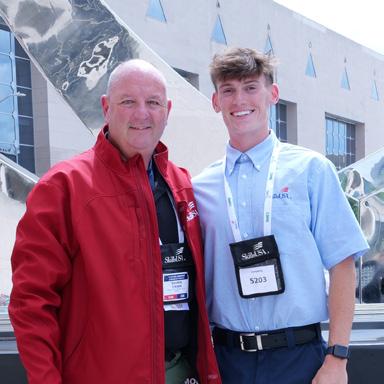
MCC national medalists also included Winston Ruzicka, who took silver in the college firefighting competition. His performance marks the third consecutive year a student in the Fire Science Technology program has finished in the top three
nationally. Competing as a team in the college division, AJ Konecny and Eli Mohr won bronze in 3D visualization and animation.
“I am proud of how all our students represented MCC at the SkillsUSA Championships,” said Scott Broady, MCC dean of skilled trades and technical sciences. “In addition to the exposure to opportunities in the industries they are interested in, SkillsUSA provides an impactful, hands-on learning experience on their way to a rewarding career.”
MCC President Randy Schmailzl jokes about the College’s “undefeated record” in athletics (MCC has never competed in athletics). That makes the SkillsUSA Championships like a Super Bowl of sorts for MCC students and instructors, Lytle said.
“If you’re not really into sports but have always looked up to those people in school, like the varsity team captain, SkillsUSA is kind of your own way of becoming a role model in your trade,” Lytle said.
Joe Baker, MCC auto collision technology instructor and member of the SkillsUSA Nebraska Board of Directors, said student performances at the event are celebrated across MCC programs. Students who medal at the event receive podium flags, which are put on display in view of first-year students. They hang from places like the Capstone lab in the Construction Education Center on the Fort Omaha Campus, from a ladder perched above a firetruck at the MCC Applied Technology Center and in a classroom on the South Omaha Campus that hosts entry-level auto collision technology courses.
Academic programs new to MCC, like Outdoor Power Technology, or new to SkillsUSA, like 3D visualization and animation, will need to determine where to display their awards — the fun work of starting new traditions.
“In addition to the exposure to opportunities in the industries they are interested in, SkillsUSA provides an impactful, hands-on learning experience on their way to a rewarding career.”
“These awards serve as a source of inspiration for our students, motivating them to aspire to achieve the same and encouraging everyone to give their best effort,” Baker said.

It will be the second incoming auto collision technology class to see Lytle’s podium flag on display. With it honoring a first-place performance in 2024, Lytle said it means a little more to him this year.
“When I competed last year and took third place, I only had about a month of experience under my belt, so I wasn’t expecting to have that kind of success. That really made me think, ‘Wow, what can I do next year?’ With this being my last year of being able to compete at the college level, improving on last year was definitely my motivation,” Lytle said.
Lytle, who graduated from MCC in May and has been working at B Street Collision Center since last year as a damage assessment writer, said he felt much more relaxed and able to focus on his event having experienced the competition before. Lytle said the competition format at SkillsUSA is representative of actual collision damage appraisal work in a body shop.
“The estimates I wrote in Atlanta were written exactly the same way I would write them at my work, so I felt very comfortable. It was a night and day difference from last year when I was taking it all in,” Lytle said.
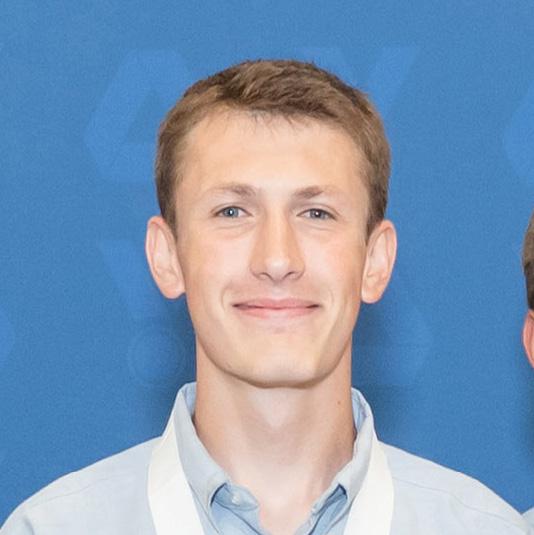
Zeleny finished in 8th place last year representing Gretna High School at nationals. The 2024 high school grad participated in the MCC Plumbing Career Academy this year, and like Lytle, felt more relaxed in Atlanta the second time around. He focused on “enjoying the moment.”
Zeleny, who will continue at MCC next year in the Plumbing Apprenticeship program, said while he played down his expectations, he wanted to at least finish in the top 10 like last year. When his name appeared on the jumbotron as a top-three finalist in the high school competition, his anticipation heightened.
“They don’t tell you what order you finish in, you just see your name on the screen. I was just waiting and didn’t hear my name called for third or second,” Zeleny said, realizing he had just won his event. “I was like, ‘Wow, that’s wild.’ I was just
speechless. I was really happy with myself and how far I’ve come.”
Zeleny’s older brother, Willy, started a plumbing business, and Wyatt started learning from him during his sophomore year of high school. MCC plumbing instructor Andy Queen said he recognized Zeleny’s talent, crediting his work ethic and advanced maturity to his success in Atlanta.
“When you listen to Wyatt talk, it’s about wanting to build something, wanting to pursue something and earning the scholarships to pay for his apprenticeship coming up. Having a student like Wyatt — other students feed off that. Being able to say, ‘Hey, watch Wyatt for a second to see how he’s doing that.’ I was very fortunate to have him in class,” Queen said.
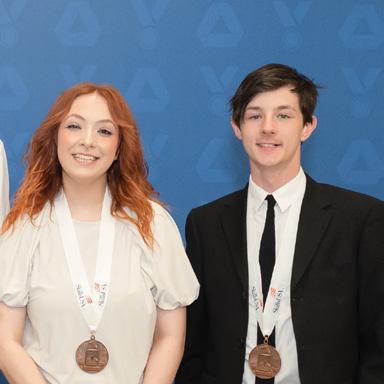
Naumann and Fey also built on past success in Atlanta. The repeat Nebraska champions made noise in the audio-radio production category with a bronze medal at nationals. In preparing for Atlanta, they focused on prioritizing their workflow, learning from last year’s challenges and optimizing their individual strengths while working on a collaborative project.
They created a radio production that included two news segments that stemmed from an interview with a local business. Naumann focused more on the script writing and Fey managed the audio editing process.
“We knew what worked last year, and we knew what didn’t,” Naumann said after the state event. “Our judges said we made a lot more progress from last year, and that was really nice to hear. It was a fun experience, and it really tested us.”
Scholz led a trio of MCC students who earned medals competing at SkillsUSA for the first time.
Terry Kuebler, MCC Powersports and Outdoor Power Equipment Technology instructor, helped launch the program at MCC last year. Through his career in the industry and past roles in postsecondary education, he’s been involved with SkillsUSA at the national level. One of his favorite things about SkillsUSA is seeing students’ passion play out on the competition floor.
“Students study our program because they love powersports and outdoor power. We even have high schoolers taking extra night classes because they want more. We want to tap into that passion so they can achieve anything they put their minds to, and SkillsUSA is a great opportunity to capitalize on that,” Kuebler said.
Scholz, who started his own small engine repair business before the Outdoor Power Equipment Technology program was offered at MCC, said he sees the value of the MCC curriculum and instruction, how it helped him at SkillsUSA and develop as a small business owner.
“I really learned the more refined and technical stuff about small engine repair in school, which has been really useful. I wouldn’t have done nearly as well in this competition if it wasn’t for the classes I’ve taken with Terry [Kuebler] and Paul [Brusegaard],” Scholz said.
Kuebler said the significance of all of his students registering for the program and competing at the state and national levels wasn’t lost on him.
“It’s always exciting seeing young people experience things for the first time and witness the sense of accomplishment, whether it’s the first to get degrees in our program, compete at Skills and now place at nationals,” Kuebler said. “We are so proud of what all of our students have accomplished in the first year. We have seen them all grow so much in their knowledge, understanding and capabilities. I’m really excited about our future.”
Jordan Scribner, MCC design, interactivity and media arts instructor, was also a first-time participant. Competitions that showcase technical digital skills have a growing presence at the annual conference. Only learning about SkillsUSA in January, Scribner guided the first MCC students to participate in the 3D animation and visualization event to a third-place finish.
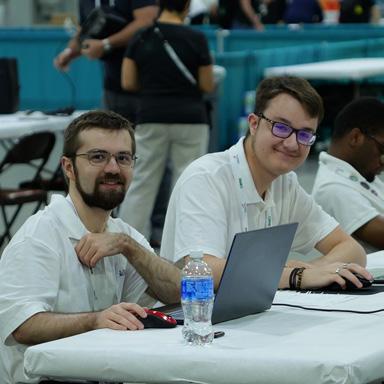
Scribner said he appreciated the unique opportunity for insights the competition format gives instructors into their students’ development and their teaching. Konency and Mohr, competing as a team, impressed Scribner with their approach to the competition, as well as embracing being program pioneers.
“As faculty members, we always see our students’ work. We see them graduate and get jobs in their field, but it’s very rare while they’re still in school to get such a concrete affirmation that their studies are paying off,” Scribner said. “The value of competing goes so far beyond getting a medal or financial rewards. These competitions are a perfect venue to stress test your skills in a way that reflects professional practice more than any classroom.”
A shared theme among all instructors and students was that SkillsUSA provides positive, career-track affirming experience and opportunities to connect with like-minded peers and professionals in a fun, hands-on educational environment.
“Even if they had finished dead last, I still would be incredibly proud of AJ and Eli for the amount of thought they put into presenting their best selves and connecting with their competition. The entire group of 3D animation contenders formed a group chat that included one of the judges who is an impressive member of Epic Games, makers of the popular Fortnite ® series. They left the competition elated, ready to try out new ideas to push their skills, and already talking about competing next year.”
3D Visualization and Animation (college)
Bronze: AJ Konecny, Eli Mohr
Audio-Radio Production (college)
Bronze: Chad Frey, Olivia Naumann
Collision Damage Appraisal (college)
Gold: Joe Lytle
Firefighting (college)
Silver: Winston Ruzicka
Plumbing (high school)
Gold: Wyatt Zeleny
Power Equipment Technology (college)
Gold: Callan Scholz
Congratulations to all the MCC students who represented the College at 2024 SkillsUSA events. SkillsUSA Nebraska medalists included the following students:
3D Visualization and Animation (college
Gold: AJ Konecny, Eli Mohr
Audio/Radio Production (college)
Gold: Chad Fey, Olivia Naumann
Automotive Refinishing Technology (college)
Silver: Callie Nickerson
Bronze: Cole Fancher
Automotive Service Technology (college)
Silver: Geoffrey Courtney
Carpentry (college)
Bronze: Naveh Offord
CNC Programmer (college)
Gold: Angelo Perry
Silver: Samuel Wulf
Collision Damage Appraisal (college)
Gold: Joseph Lytle
Silver: Jeremy McBride
Collision Damage Appraisal (high school)
Gold: Clara Stilen
Bronze: Fernando Gonzalez
Collision Repair Technology (college)
Gold: Anne Dovali
Silver: Cody Mantonya
Bronze: Kaden Beckstrom
Collision Repair Technology (high school)
Gold: Cole Vanderheiden
Diesel Equipment Technology (college)
Bronze: Gerson Franco
Diesel Equipment Technology (high school)
Gold: Zack Carson
Silver: Brody Coursey
Digital Cinema Production (college)
Gold: Kaden Andersen, Gabriel Ysusi
Silver: Mariah Abney, David Mosso
Bronze: Joshua Cryer, Brennan Hanson
Electrical Construction Wiring (high school)
Silver: Rhett Bergsten
Bronze: Liam Foley
Firefighting (college)
Gold: Winston Ruzicka
Firefighting (high school)
Gold: Jaxon Christensen
Heating, Ventilation, Air Conditioning and Refrigeration (college)
Gold: Dustin Fredericks
Motorcycle Service Technology (college)
Gold: Blake Tarver
Photography (college)
Gold: Ramses Barrios
Plumbing (high school)
Gold: Wyatt Zeleny
Power Equipment Technology (college)
Gold: Callan Scholz
Precision Machining Technology — state only (high school)
Gold: Brandon Gallo
Silver: Jenson Groff
Bronze: Aaron Adams
Technical Team Problem Solving — state only (high school)
Gold: Mitchel Budoff, Geoffrey Courtney, Gavin Griggs
Television/Video Production (college)
Gold: Oluwatobi Ajise, Paul Grinbergs
Welding (college)
Gold: Denver Fincham
Silver: Porter Chandler
Bronze: Kamrin Kavan
Welding (high school)
Gold: Tyler Winsor
Welding Fabrication (college)
Silver: Eli Bothwell, Nicholas Kroupa, Maddie Watts
Welding Fabrication (high school)
Gold: Josh Bennett, Aidan Roumph, Hunter Volcheck
Welding Sculpture (college)
Silver: Trevor Moody
Welding Sculpture (high school)
Gold: Hannah Wieczorek
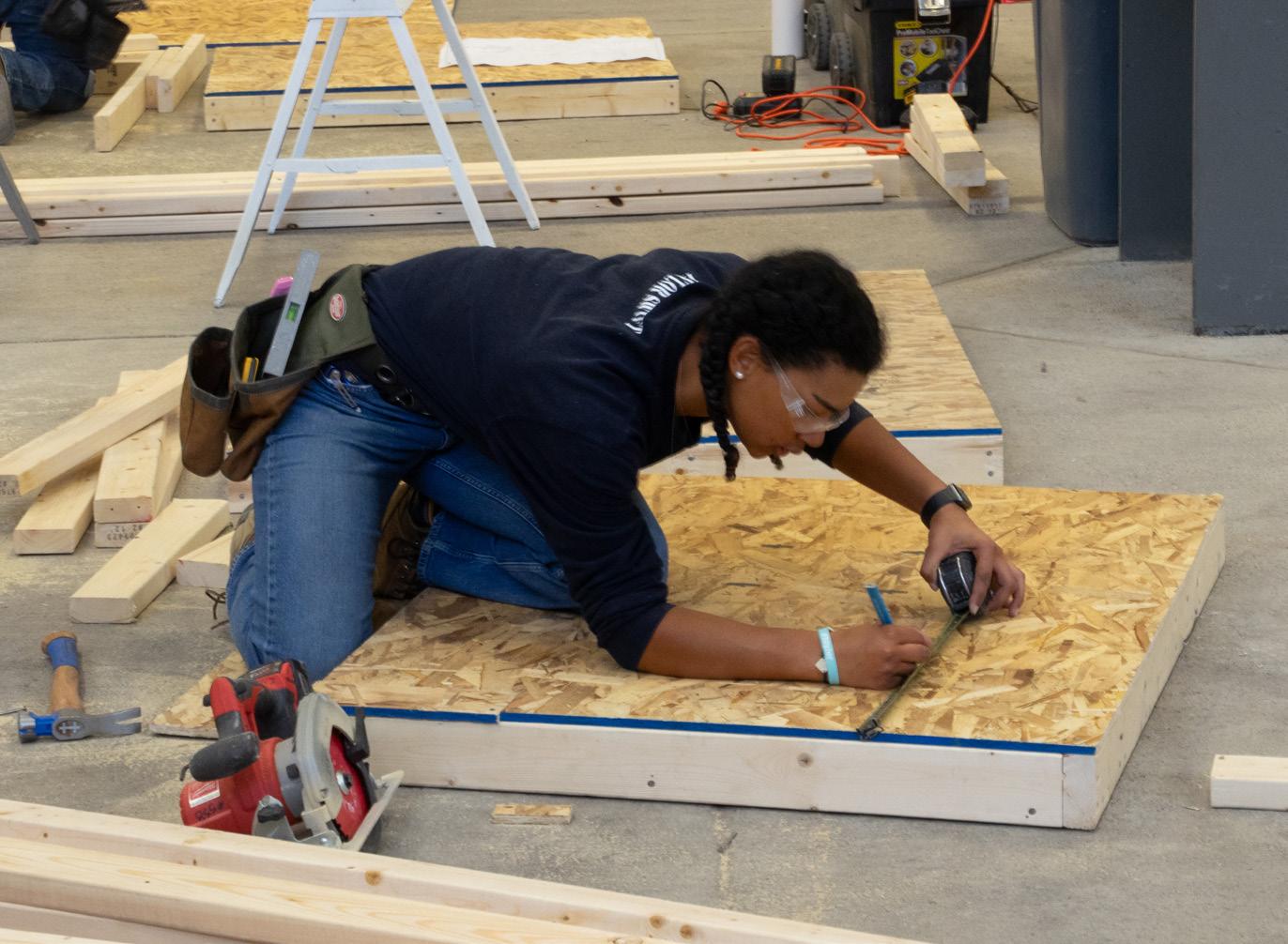



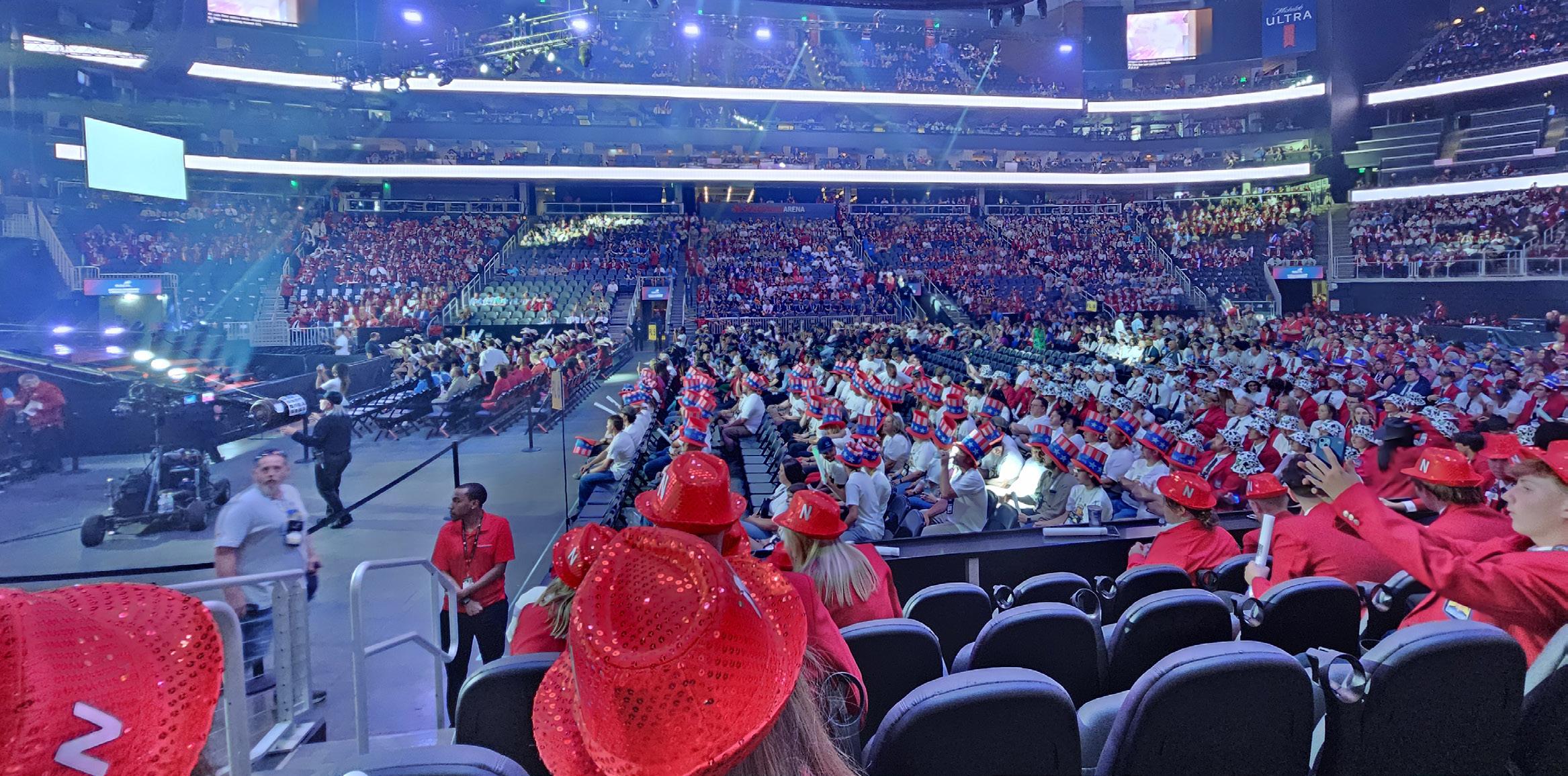
Metropolitan Community College
P.O. Box 3777
Omaha, NE 68103-0777
Stay informed. Connect with your community. Visit issuu.com/mccneb to view and share this issue online.

MCC alumni, keep us updated on your personal and career achievements by emailing fans@mccneb.edu.



